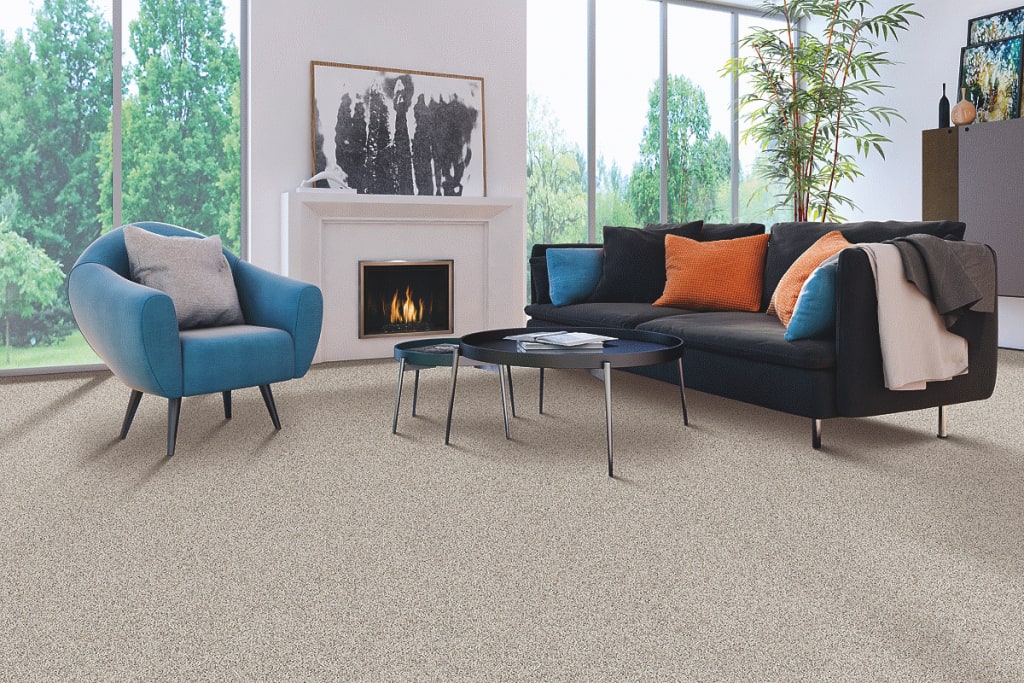When carpet suddenly starts to fray, fuzz, pull apart or look shaggy, you might not realize that your choice in vacuum cleaners could be the culprit! The qualities that many leading vacuum brands are known for are sometimes precisely what makes them unsuitable for some types of carpet. High-end vacuum cleaners with superior suction power and robotic vacuum cleaners can cause serious issues with certain kinds of carpet. Because these vacuum types are typically not adjustable to accommodate different carpet heights, they are not recommended.
Don’t ruin your beautiful new Mohawk or Karastan carpet by using the wrong vacuum! We recommend purchasing a vacuum cleaner that is certified by the Carpet and Rug Institute (CRI) Seal of Approval/Green Label Vacuum Cleaner Program. But if you already have a vacuum cleaner you love, here are three things to look at in order to determine if you can use it on your Mohawk or Karastan carpet.

- Vacuum Height
Adjustable height is the most important feature to consider. This enables the machine to be used on a wide variety of carpet constructions. If your vacuum is set too high above the carpet surface, the vacuum can’t attract the gritty soil below. If the setting is too low, the vacuum’s beater bar or brushes can “fuzz” the carpet’s surface, causing it to look worn or frayed.
Different carpet types will require different height settings, depending on the pile height and fiber type. High pile and premium soft carpet generally require the highest height setting, while for thick loop, casual frieze, or long pile carpet, you may need to disengage the beater bar entirely and vacuum with suction only. If you’re not sure which height setting is best for your carpet, try a test run in an inconspicuous area of your home, such as a closet. - Suction Type
While extreme suction power may offer peace of mind to homeowners who want to feel confident that their vacuums are effective at sucking up dirt and germs, it can be very damaging to your carpet and should be avoided! For high pile and premium soft carpet, be sure to avoid vacuums with concentrated or sealed suction. Not only could these types of suction damage your carpet—you also will find it difficult to move the vacuum across the carpet at all!
You can check a vacuum’s suction power by testing it out, or by looking for words such as “concentrated” or “sealed” suction. Also, look at the cubic feet per minute (CFM). CFM measures the power of the vacuum cleaner’s airflow. The higher the CFM number, the more suction power it has. Most common vacuum cleaners will fall in the 50-100 CFM range, but you can find some as low as 45 CFM or as high as 200 CFM. - Beater Bar/Brushes
Use a vacuum with a rotating brush or beater bar. The beater bar or brush should just lightly touch your carpet surface; if it’s too high or too low, then make sure to adjust the height as needed. Before you start it, be sure to check the beater bars for burs and gouges to prevent damage to the surface of the carpet.
Recommended Vacuums
To maintain and clean premium soft carpet, the SONICLEAN SFC-7000 SOFT CARPET UPRIGHT VACUUM is highly recommended. This vacuum cleaner features a patented sonic bar that produces 200 sonic vibrations per second, and a jam protection system to prevent any brush roll problems.
You can also find a full list of CRI-certified vacuum cleaners on the Carpet and Rug Institute website.









